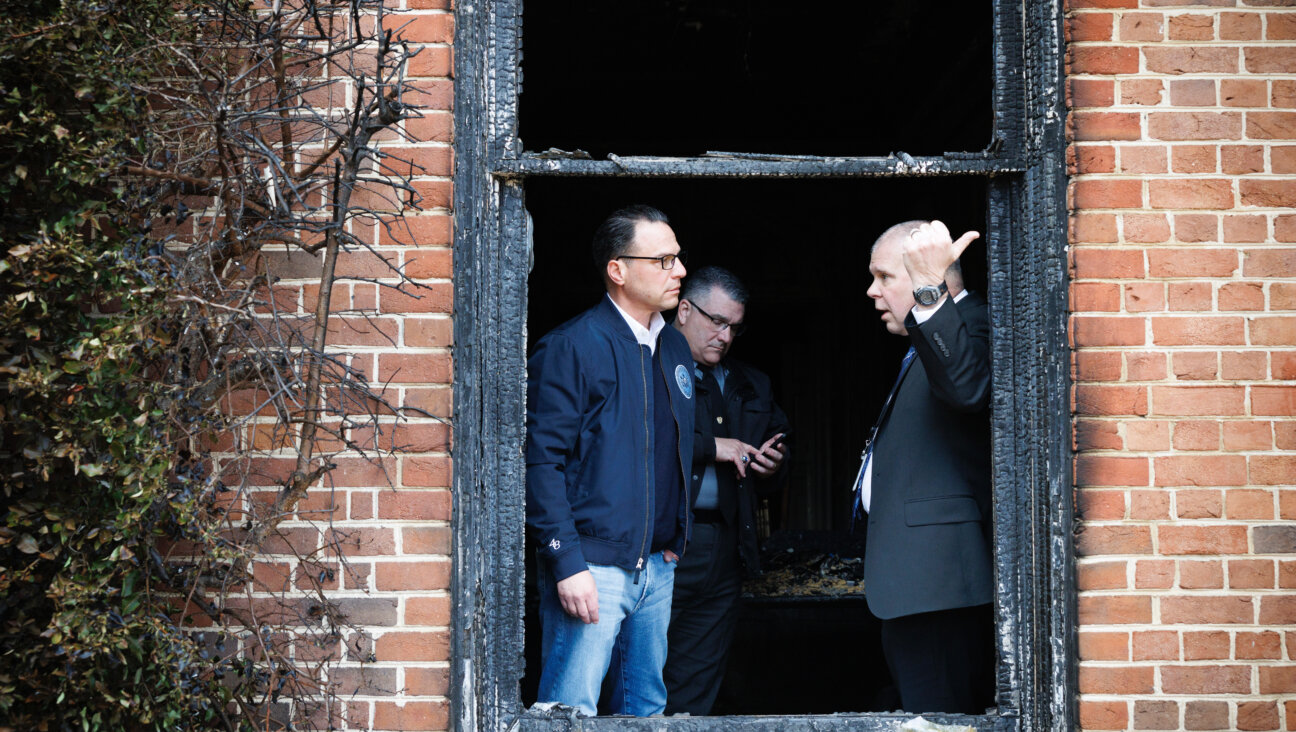As Industry Faces Criticism, a Look at How the Kosher Sausage Gets Made

For consumers trying to determine where their kosher meat comes from, there has been little public information about the companies that slaughter and process kosher beef and poultry, and even less information about how those companies treat their workers.
After a highly publicized immigration raid this past May on the nation’s largest kosher slaughterhouse, Agriprocessors in Postville, Iowa, a group of Conservative rabbis issued a new set of ethical guidelines, known as Hekhsher Tzedek, that aims to evaluate the labor conditions under which kosher meat is produced. That effort got a big boost this week when the Central Conference of American Rabbis endorsed it.
“Those who produce kosher meat are engaged in sacred work and therefore are expected to adhere to the highest standards and values of Jewish tradition,” said a statement issued by the Reform rabbinical group. “Those who keep kosher… should not be forced to choose between their ritual observance and their ethical values.”
But the first Hekhsher Tzedek evaluations are not expected for several months. And so, for now, the people focused on these issues are Jewish labor activists and the unions that have been trying to organize plants such as Agriprocessors and Alle Processing (see related story).
Labor unions have a self-interested role, and some companies have told workers that unions are interested not in them but rather in the dues that are collected from them. But not all companies have an antagonistic relationship with unions, and the picture of kosher plants that is painted by labor activists is not uniformly critical, even at nonunion plants.
One plant to earn praise from some labor activists is Noah’s Ark, a relatively new and small operation in Minnesota that sells kosher beef, elk and bison under the Solomon’s label. The workers at Noah’s Ark, which is owned by Ilan Parente, are not members of a union. A few people who have toured the plant and spoken with workers say that they have seen positive things.
“It is a very relaxed tone. You go through, and the owner is saying hello to everyone,” said Joe Regenstein, director of the Cornell Kosher Food Initiative and a professor at Cornell University. Regenstein toured the company facilities in Dawson, Minn. “I felt it was probably in the top third of people seeming happy,” he said. “Meat plants are hard places to be fun — but people seemed to be happy — and Ilan seemed to know everyone by name.”
Regenstein and others who spoke about labor conditions at kosher plants cautioned that their observations were more impressions than detailed analysis.
Competing delegations of rabbis have toured the Agriprocessors plant. While an early group of Conservative rabbis criticized conditions, a more recent delegation of Orthodox rabbis, whose trip had been paid for by the company, praised what they saw.
Evaluating the labor conditions in which kosher meat is produced can be difficult because of the complex production chain. Many kosher beef producers do not own slaughterhouses and instead buy beef quarters from independent slaughterhouses. Alle Processing, for instance, has employees who work for the company in Queens, but the company has much of its meat slaughtered at Aurora Packing Company, which has its own employees. While employees have criticized Alle, Aurora has a positive reputation among labor experts.
Agriprocessors is one of the few kosher beef companies that own both the slaughtering and processing facilities. It is so large that industry experts say it produces meat for other kosher companies that sell it under different labels. To add to the confusion, even though Agriprocessors has its own slaughterhouse, it has procured significant amounts of raw meat from slaughterhouses in South America, as other companies have done.
For kosher poultry, the situation is somewhat simpler because most companies do their own slaughtering and processing.
Currently, Orthodox kosher supervisors are stationed at all points in the kosher production, but they have declined to speak about labor conditions. Many Orthodox rabbis involved in kosher certification have criticized the Hekhsher Tzedek movement and said that labor matters should be left to the government.

The Conservative rabbis supporting Hekhsher Tzedek say that the complex production chain necessitates additional oversight from Jewish authorities.
“These plants are producing the food that we are obligated to eat and no one else is looking into it,” said Rabbi Morris Allen, who spearheaded the new guidelines. “Not the government. Not the plants. Not always the union. That’s ultimately what we want to do.”
Agriprocessors made headlines when nearly 400 undocumented workers were arrested at the plant last May, but it is not the first kosher company to be similarly scrutinized. Empire Poultry, which recently supplanted Agriprocessors as the largest kosher poultry producer in America, was the subject of an immigration raid in 2001. Nearly 150 workers were arrested at Empire’s plant in Mifflintown, Pa. Since then, the company has changed management. In 2006, members of the Conservative movement who had visited, and criticized, Agriprocessors visited Empire’s plant and found a noticeable difference between the work relationships at the two companies.
“The difference is night and day,” said Avi Lyon, who was then executive director of the Jewish Labor Committee and is now a consultant to labor unions. Speaking of Empire, he said, “the relationship between management and the union is one of cooperation. There have been occasional disagreements, but they have a mechanism for working them out — and they work them out.”
The United Food and Commercial Workers represents Empire workers. In 2007, the Jewish Labor Committee honored Empire and its executives for the company’s worker relations.
Unions have a storied history in the kosher industry. In the early 20th century, they were seen as providing a support system for recent immigrants who worked at kosher butchers. At mid-century, the kosher industry was thoroughly organized, and there was an entire local, Local 50, in the Amalgamated Meat Cutters union dedicated almost entirely to kosher meat companies.
More recently, a number of kosher companies have followed national trends and moved from the East Coast, in part to escape the hold of unions there. Local 50 merged into what is now the UFCW, which is responsible for most unionized kosher plants today. One exception is the International Brotherhood of Teamsters, which is responsible for 260 workers at the Hebrew National processing plant in Michigan. Hebrew National produces mostly processed rather than fresh meat, and it does not carry the glatt kosher certification that many Orthodox consumers demand.
Among the 15 largest kosher meat companies, seven are unionized, according to a survey done by the Forward (see chart).
The two largest kosher beef producers, Agriprocessors and Alle, have both resisted union efforts by the UFCW. In a letter to consumers, the former head of Agriprocessors, Sholom Rubashkin, said that the UFCW used coercive tactics in dealing with his company.
“The UFCW, as it has in the past, we believe, is engaging in a course of conduct which has been referred to as ‘waging economic war on an unorganized company,’” Rubashkin said in the November 2007 letter.
“We believe that the Union has been instrumental in orchestrating frivolous investigations of our company, by governmental authorities,” the letter said.
Scott Frotman, a spokesman for the UFCW, denied the charges and said that “the Rubashkins have chosen to blame everyone else for their troubles.”
For workers, labor unions generally provide a guarantee of certain minimum standards, including employee-funded health care and mandatory sick days and vacation days; they also generally provide guaranteed pay raises, which employees at Alle and Agriprocessors have said are not common. At Jewish plants, unions often advocate that employees be paid on Jewish holidays when plants are closed.
Some owners of kosher companies said that unions make it easier to do business. One such owner is Marvin Fagel, who inherited the Aurora Packing Company just outside Chicago from his father. Today, Aurora serves as a slaughterhouse for a number of kosher food producers, including Alle. Aurora has long been organized by the UFCW, and Fagel says that this has made his life easier.
“It does give you an avenue for communication,” Fagel told the Forward. “If you have a structure in place, and you follow it, you have a means with dignity and respect to resolve all issues. We won’t always agree, but there is a method in place to resolve those differences. That’s a good thing.”
The company appears to be the only kosher producer enrolled in the Occupational Safety and Health Administration’s Voluntary Protection Programs. Eli Fishman, director of the Jewish Labor Committee’s Chicago branch, visited the plant after problems surfaced at Agriprocessors and met with Fagel.
“He’s just a real decent guy and runs a real decent operation,” said Fishman, who spoke with union workers at the plant.
But Noah’s Ark’s Parente said that the presence of a union is less important than the outlook of the owner.
“It comes down to management,” Parente said. “If there is a good environment, and it’s not toxic, I think the employees can sense it.”
For a look at the Forward’s ongoing coverage of the turmoil in the kosher industry, click here.
The Forward is free to read, but it isn’t free to produce

I hope you appreciated this article. Before you go, I’d like to ask you to please support the Forward.
Now more than ever, American Jews need independent news they can trust, with reporting driven by truth, not ideology. We serve you, not any ideological agenda.
At a time when other newsrooms are closing or cutting back, the Forward has removed its paywall and invested additional resources to report on the ground from Israel and around the U.S. on the impact of the war, rising antisemitism and polarized discourse.
This is a great time to support independent Jewish journalism you rely on. Make a Passover gift today!
— Rachel Fishman Feddersen, Publisher and CEO
Most Popular
- 1

Opinion My Jewish moms group ousted me because I work for J Street. Is this what communal life has come to?
- 2

News Student protesters being deported are not ‘martyrs and heroes,’ says former antisemitism envoy
- 3

Fast Forward Suspected arsonist intended to beat Gov. Josh Shapiro with a sledgehammer, investigators say
- 4

News Who is Alan Garber, the Jewish Harvard president who stood up to Trump over antisemitism?
In Case You Missed It
-

Fast Forward Dozens of members of UK’s largest Jewish group sign letter condemning war in Gaza
-

Culture Actor Ben Platt says his Jewish identity is ‘not defined’ by Israel, showing a gap between him and his influential family
-

Fast Forward Shapiro house fire suspect targeted Jewish governor over pro-Israel stances, search warrant says
-

Fast Forward Jewish family killed in New York plane crash
-
Shop the Forward Store
100% of profits support our journalism
Republish This Story
Please read before republishing
We’re happy to make this story available to republish for free, unless it originated with JTA, Haaretz or another publication (as indicated on the article) and as long as you follow our guidelines.
You must comply with the following:
- Credit the Forward
- Retain our pixel
- Preserve our canonical link in Google search
- Add a noindex tag in Google search
See our full guidelines for more information, and this guide for detail about canonical URLs.
To republish, copy the HTML by clicking on the yellow button to the right; it includes our tracking pixel, all paragraph styles and hyperlinks, the author byline and credit to the Forward. It does not include images; to avoid copyright violations, you must add them manually, following our guidelines. Please email us at [email protected], subject line “republish,” with any questions or to let us know what stories you’re picking up.














